 |
 |
 |
 |
 |
 |
 |
 |
 |
First Division - Elland Road - 36,477
Scorers: Giles 2, Clarke, Bremner, Lorimer
Leeds United: Harvey, Madeley, Cherry, Bremner, Charlton, Hunter, Lorimer, Clarke, Jones, Giles (Bates 51), E Gray
Derby County: Boulton, Robson, Nish, Durban, McFarland, Todd, Daniel, Gemmill, O'Hare, Hector, Hinton
On 8 May 1972, two days
after beating Arsenal to win the FA Cup,
United required just a draw at Wolves to secure the championship.
They lost 2-1, allowing Derby, on holiday in the Scilly Isles,
to claim the title almost by default. The failure was all the
more galling for Revie because County's manager was the outspoken
Brian Clough. The Rams boss was a regular and vitriolic critic
of the approach espoused by Revie and his team. Clough wrote in later years, 'On one occasion I was so incensed
by their flouting of the rules that I went on record saying Don Revie
should be fined and his team kicked out of the First Division and dumped
in the Second. They didn't like that at Elland Road. They gave the impression
that they were prepared to trample on anyone who attempted to criticise
their flawed talents. 'Leeds had been the dirtiest and most cynical team in the
country in the late Sixties and early Seventies, and from my soap box
as manager of Derby and the best pundit on television I had said so on
numerous occasions. I prided myself on producing teams who didn't argue
with referees and linesmen, who didn't blatantly waste time, and who could
anticipate a bollocking and a fine from me if they resorted to any form
of dissent. Derby County and, later, Nottingham Forest were the best friends
English referees ever had. So many of them told me my teams were the easiest
and most pleasurable of all to control. I can say, without fear of contradiction,
that no referee ever said that of Leeds in the Revie era. 'I despised what they stood for - systematically putting
referees under intolerable pressure with their violent behaviour, both
physical and verbal, their overreactions, and the unsavoury spectacle
of skipper Billy Bremner running alongside the harassed referee, constantly
yelling in his ear. They angered and offended me to such an extent that
I took every opportunity to condemn their cynicism which, for me, devalued
so much of what they achieved and the marvellous football of which they
were capable - a high level of skill and organised teamwork that I, like
millions, admired. Leeds, in those days, cheated - and I was more than
happy to draw people's attention to the fact.' Don Revie: 'It must be abundantly clear to most soccer followers
that Derby County manager Brian Clough and myself are not exactly the
best of friends. As our relationship stands at the moment, he is the last
person with whom I would wish to be stranded on a desert island, and no
doubt he feels the same way about me. 'Why? From my point of view it all boils down to the fact
that I dislike the way Clough repeatedly knocks other personalities in
the game - especially rival managers. I think it is wrong to criticise
your colleagues as Clough does, because the job is difficult enough without
any of us slitting each other's throats. Sir Matt Busby, Sir Alf Ramsey,
Malcolm Allison and Allan Brown before he lost his job at Sunderland have
all had verbal lashings from him. 'Generally, there is a tremendous spirit of good fellowship
among the League's managers, but that wouldn't be the case if we were
all like Brian Clough. 'I find it surprising that he should appear to be so indignant
about teams going Peter Lorimer: 'I first came across [Clough and discovered
his true feelings when, in the early 1970s, I won the Sports Personality
of the Year award at the Yorksport dinner under the auspices of Yorkshire
Television at the Queens Hotel in Leeds. This was a prestigious award,
voted for by Yorkshire Television viewers, that had previously been won
by the Formula One racing driver Jackie Stewart. 'There was a lot of kudos attached to it and there were
always important figures invited to present the awards. On this particular
occasion, the man handing over the trophies was no less than the prime
minister of the day, Yorkshireman Harold Wilson. The guest speaker was
Brian Clough. 'I duly received my award from the Prime Minister but missed
out on the pleasure of listening to Old Big 'Ead on this Sunday evening
because we had a Cup replay against Manchester United at Villa Park the
following evening, and while Don kindly allowed me to collect the award,
he ensured that there was a car waiting outside to whisk me straight to
Villa Park to join up with the rest of the squad. 'I was therefore in blissful ignorance about what was such
a diatribe that it quickly gathered notoriety for its ridiculous content.
These were the days when there were no mobile telephones, of course, and
thank goodness for that, because that night the phone at our team hotel
never stopped ringing with requests from reporters wanting to speak to
someone about Mr Clough's outburst concerning Leeds United and me at the
dinner in Leeds. 'Even before he was due to make his scheduled speech, he
got up and told a packed auditorium that he had sat there and listened
to a load of codswallop about the greatness of Leeds United and the brilliance
of Peter Lorimer. It was time now, he asserted, that he had his say. He
had had enough of being made to sit through all this bulls**t. But before
he embarked on his speech, he said, the audience could sit there and wait
patiently, just as he had done, until he had paid a visit to the lavatory. 'Well, of course, with the Prime Minister and all the local
dignitaries of the city of Leeds being there, this sudden announcement
of an unscheduled break in the proceedings did not go down too well. When
he returned, he launched full throttle into an undisguised attack on Leeds
United. 'Calling us cheats, he said that we had never won anything
fairly. As for me, he held that the Sports Personality of the Year award
had gone to the wrong man. I wasn't a sportsman, he said. I was a cheat.
I was always diving. Always trying to 'It amounted to a full frontal assault on both the club
and me, in front of a largely partisan audience in our home city. Of course,
he got shouted down. People were on their feet and telling him to sit
down. The boos started and he never got to finish his speech. 'It must have been quite funny on the night. I wish I'd
been there. I quite enjoy a bit of banter and, of course, people are entitled
to their opinions. There is no way I would have responded, however. I
would merely have enjoyed the surrealness of it all.' A few weeks before the Elland Road clash between
Leeds and Derby at the beginning of October 1972, Clough was publicly
berated by the Football League, with Derby being warned that,
unless he refrained from some of his more controversial comments,
disciplinary action would be taken against the club. Derby had not started well in their defence of the
title: they were fourteenth in the table with just two goals and
two points gained away from the Baseball Ground. United themselves had been below their own customary standards.
They had lost two games on the bounce in thelLeague, the second the previous
weekend a 2-1 defeat to league leaders Liverpool. That ended an 18-month
unbeaten record at Elland Road. In the days before they hosted Derby, Leeds had
struggled to snatch a draw from a testing League Cup-tie at Villa
Park. Scottish international winger Eddie Gray, who had made only
seven first-eam appearances all season because of a thigh injury, returned
to the side against Derby, as did midfield general Johnny Giles, recovered
from the back injury which kept him out of the Villa game. Derby were at strength, although their team showed
one change from the side held to a 0-0 draw by Chelsea in the
League Cup. Steve Powell, their highly rated youngster, was rested,
and John Robson came back into a defence which included England
internationals Roy McFarland and Colin Todd. David Nish, an expensive
recruit from Leicester, completed the rearguard, and Leeds-born
Kevin Hector was on duty up front. Derby's position in the lower half of the First Division
was acknowledged by Revie as misleading: 'Over the last two or three seasons
Derby have proved themselves to be a great side, and they have too many
good players to remain down the table. There is no doubt that they will
soon begin to climb, though we shall be out, of course, to see that their
progress does not begin tomorrow.' Great teams do not become bad teams overnight and
Revie was well advised to be cautious, though some of his anxieties
were dispelled by a United goal in the third minute. Leeds had started on the front foot with Mick Jones
climbing to meet Eddie Gray's centre, but When Peter Lorimer threw the free kick high into
the heart of the Derby area, McFarland rose unchallenged to head
it away. He should have done better and his clearance had more
height than distance as it looped towards Johnny Giles, lurking
25 yards from goal. The Irish schemer steadied himself and sent
an instant volley soaring high over the onrushing Derby defenders
before it dipped viciously under goalkeeper Colin Boulton's crossbar. There might have been a hint of speculation about
the effort but it was certainly precise, alighting sweetly between
Boulton and the woodwork. Despite being in arrears, Derby had as much of the
play in these early stages as United, who seemed a little unsure
of themselves. The visitors responded to the early concession
by winning a corner after Durban made a good run forward. County then inexplicably allowed Leeds to settle
into their game. John O'Hare started very well and Kevin Hector
was a constant thorn in the United flesh, but the Rams had few
other major contributors. It was almost as if they went into the
game expecting to be second best. There was a lull before the next goal, coming after
27 minutes had elapsed. Trevor Cherry brought the ball out to
play a one-two with Gray at half way before making his way at
pace towards the area. He tried to feed a killer through pass
to Allan Clarke on the left, but the ball was blocked by Alan
Durban, and ran inside to Giles, 25 yards from goal. Confidently,
the Irishman took possession and got the ball out of his feet
to fire a screamer past the diving Boulton, just inside the left
hand post, a stunning strike. The goal brought strong Derby protests for offside
against Clarke, but the referee would have none of it and booked
McFarland for too vigorous a protest. United were firmly in control of the game now and
increased their advantage eight minutes before the interval. Giles fired a long ball from deep inside the Leeds
half forward to Jones, five Just before half-time, Durban went into referee New's notebook
for bringing down Bremner who needed treatment for a leg injury. McFarland
and Lorimer also received cautionary words when the United man was felled
and retaliated. After the restart, Gray probed hard at the Derby
rearguard as United sought to rub in their superiority, but his
efforts came to naught. After 51 minutes Giles had to go off after sustaining
a leg injury when challenging a Derby man. The playmaker went
off to loud applause as Mick Bates came on to replace him. If Derby saw the loss of their two-goal tormentor
as a reason for fresh hope, their ambitions were soon destroyed
as their arrears grew on the hour. Madeley fed Bremner five yards into the Derby half.
The space opened up as County players retreated before him and
the United skipper took the ball on twenty yards leaving opponents
in his wake. As Bremner reached the 25-yard point, he noticed
Boulton advancing off his line. The Scot promptly lashed in a
shot, again just inside the top angle; this time Boulton was transfixed
on the six yard line and could only watch helplessly as the shot
billowed the net. Despite the yawning gulf of the 4-0 scoreline, there
was still enough feeling in the contest for some nasty transgressions
to hint at the rancour between the sides; Hunter was booked for
fouling O'Hare and Colin Todd followed him when he felled Jones. Two minutes from time, United crowned a memorable
afternoon for their gleeful supporters with a fifth goal. Clarke got possession ten yards into Derby's half
and pushed the ball forward down the That was the last meaningful action of the afternoon
and United went off to thunderous applause. Asked afterwards what had gone wrong, a morose Brian
Clough would only shake his head sadly as he muttered, "Five brilliant
goals." Richard Ulyatt in the Yorkshire Post: 'No visiting
team ought these days to be caught napping, for all of them pack the defence
monotonously with all sorts of players who seldom get a chance on their
own grounds. For example, Derby had Daniel, never a winger normally, at
outside-right, just as Leeds recently played Yorath, a centre-half, at
outside-left. 'Leeds United's outside-left this time was the adroit Eddie
Gray who has been nagged by a deep seated injury which made him a doubtful
starter. He showed no sign of it. He completed the team's balance so that
the attack was not all down the right wing, and after the match reported
himself fit to play again, though I understand his troublesome thigh was
sore yesterday. 'Gray, Bremner and Giles at times toyed with the Derby defence
in which their star players, McFarland, England's centre-half, Nish and
Todd were less factual value than their billing, but one of the main reasons
why Derby did not really get into the game was the ineffectiveness of
Archie Gemmill, without whom they are poor as Arsenal used to be in their
championship years when Alex James was missing or Huddersfield Town were
when Clem Stephenson had an off day. 'Derby's success has been built largely round the consistent
ability of Gemmill to do the unexpected which usually proves the right
thing to have done. This time Bremner did not let him get away with anything
and Kevin Hector strove without help to get the line moving. The effect
was rather like Leeds United, 'This time both those two smart midgets dovetailed smoothly
and the combination of their success, plus the failure of the Gemmill-Hector
blend brought about this devastating result, which on the basis of possession
of the ball and endeavour was not otherwise justified. 'With Gemmill's plots misfiring, the ball was pumped back
and back into the Derby defence so that in the end McFarland, who was
not notably happy at the start, was in some distress by the end. Derby
on another occasion might have saved Giles' two goals and the one that
Bremner scored by driving through the middle. 'They might, on another occasion, have stopped Cherry's
caper down the left wing at breakneck speed which enabled Lorimer to score
the fifth goal, but I doubt whether any defence would have stopped the
third goal, just before half time, headed by Clarke. It was one which
ought to be drawn or set to music; it was an outstanding effort of timing,
accuracy and speed which Jones, Madeley and Clarke shared with equal merit.' Paul Fitzpatrick in The Guardian: 'Don Revie, the
Leeds United manager, scarcely could conceal his delight after his side
had given their most impressive performance of the season and humiliated
Derby County on Saturday at Elland Road. 'After all, what more could a manager ask of his team? Life
is good when you have just gathered two good points, scored five first
class goals and given a display as convincing as this. Mr Revie clearly
was going to enjoy his Sunday golf in the Leeds and District knockout
- and his enthusiasm and happiness were justifiable and understandable.
Somehow, for the uncommitted observer at least, it was not possible to
share them. 'For a start, Derby were so ineffectual as to cast doubts
on their authenticity as champions of the First Division; more importantly,
there was a sinister side to the game which overshadowed all. The forces
of evil were greater than those for good so that at the end one was left
not savouring the quality of so much fine Leeds football but rather contemplating
sadly the deplorable cynicism with which one footballer can treat another. 'Four names taken, even if a booking is devalued currency
these days, represents an afternoon of anxious activity for the referee.
Yet justice should have been harsher. McFarland, who almost sliced Lorimer
in half; Todd, for a squalid foul on Jones; and Hunter, who, while lying
on his back, did a sort of bicycle exercise into O'Hare's stomach, were
lucky indeed to remain on the field. Durban also had his name taken, although
to categorise him with the other three would be as unfair as putting a
petty thief in a cell on Death Row. 'Brian Clough, the Derby manager, repeatedly has said that
a manager should be held responsible for the onfield actions of his players
and no doubt Durban, Todd and McFarland will be made to pay for their
sins. The outlook could be particularly bleak 'The first half was distinguished by much excellent penetrative
football by United and two remarkable goals by Giles who is noted for
his masterful activities in midfield and his prowess from the penalty
spot but not for scoring goals of these dimensions. His departure in the
fiftieth minute with tendon trouble deprived the game of its most accomplished
player. Derby's misery in the first half was xcompleted by a beautiful
header by Clarke from Madeley's precise centre. 'After half-time, Derby moved Nish from the back into midfield,
a move which achieved nothing, and rendered the player even more anonymous
than before. And while Derby fretted, Leeds went on their destructive
way, scoring two more fine goals through Bremner and Lorimer, the last
goal being made by Cherry, who for the most part was the one Leeds misfit.' It was a blinding performance by Don Revie's men,
far and away their outstanding display of the season. It was not
that they had that many chances in the game, with one Derbyshire
paper claiming they only had eight genuine attempts on goal, but
their accuracy from distance was astonishing, with three of the
goals coming from well outside the penalty area. The result represented some restitution for having
the League title snatched from within their grasp the previous
May and presented clear evidence that United were still a force
in the championship race. As a consequence of the result they
were restored to fifth place in the table, three points behind
pacesetters Liverpool with almost a third of the season gone.
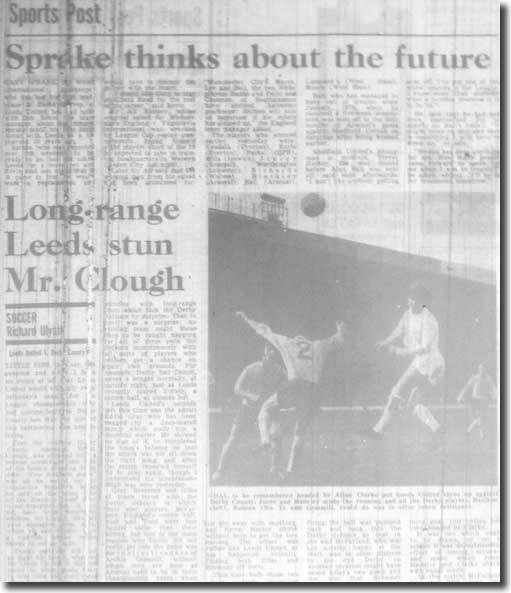 After the circumstances in which Leeds United lost out on the league
championship to Derby County in May 1972, Don
Revie and his men were desperate to gain some sort of payback, and
were given the perfect opportunity when the Rams visited Elland Road five
months later.
After the circumstances in which Leeds United lost out on the league
championship to Derby County in May 1972, Don
Revie and his men were desperate to gain some sort of payback, and
were given the perfect opportunity when the Rams visited Elland Road five
months later.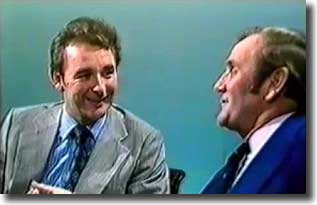 in
hard for the ball. No matter what he might say to the contrary, you can
take it from me that Derby are as physically intimidating as anyone when
the need arises.'
in
hard for the ball. No matter what he might say to the contrary, you can
take it from me that Derby are as physically intimidating as anyone when
the need arises.'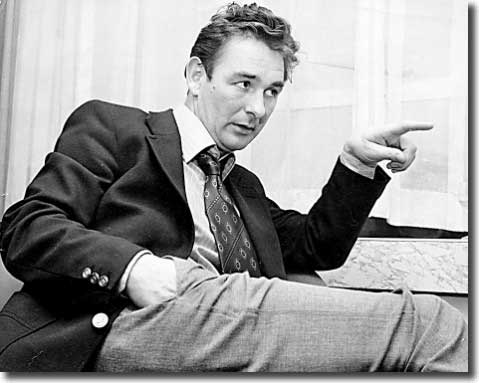 get the opposition into trouble with the referee.
get the opposition into trouble with the referee.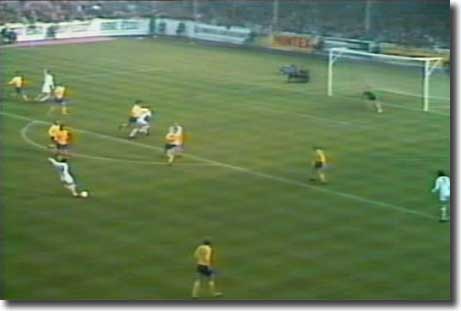 his header cleared the bar. It was but a temporary reprieve for
the visitors, who had more defending to do after Bristol referee
Harry New penalised Derby skipper McFarland for bringing down
Allan Clarke out on the right, 35 yards from goal.
his header cleared the bar. It was but a temporary reprieve for
the visitors, who had more defending to do after Bristol referee
Harry New penalised Derby skipper McFarland for bringing down
Allan Clarke out on the right, 35 yards from goal.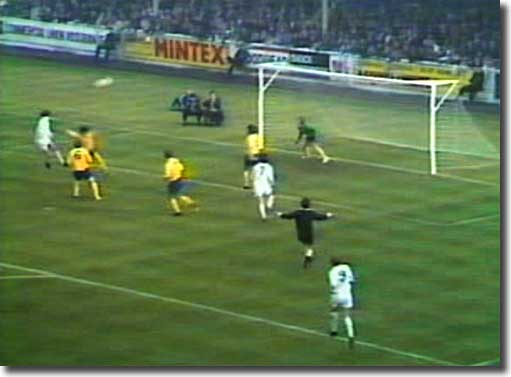 yards
outside the Derby area. He took the ball with his back to goal
and held play up long enough to allow Paul Madeley to come storming
up on the overlap down the right. The elegant utility man sent
over a first time cross which soared to the back post. Clarke
climbed above his marker to loop a header inside the angle of
post and crossbar from eight yards out.
yards
outside the Derby area. He took the ball with his back to goal
and held play up long enough to allow Paul Madeley to come storming
up on the overlap down the right. The elegant utility man sent
over a first time cross which soared to the back post. Clarke
climbed above his marker to loop a header inside the angle of
post and crossbar from eight yards out.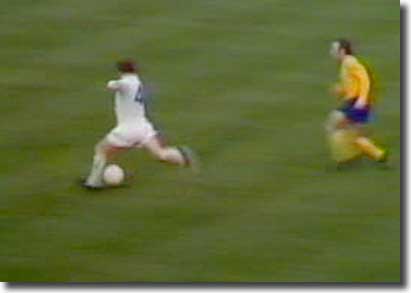 left flank for Cherry to chase. The left-back easily rounded Durban
and fired a low cross back towards the penalty spot where Lorimer
came sliding in to drive it inside the far post.
left flank for Cherry to chase. The left-back easily rounded Durban
and fired a low cross back towards the penalty spot where Lorimer
came sliding in to drive it inside the far post.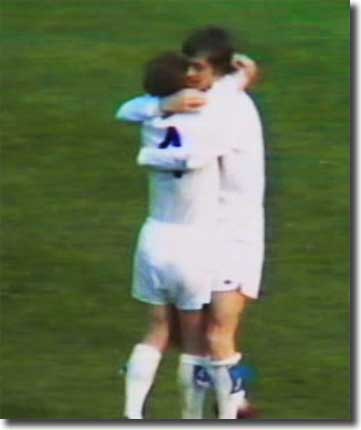 as
has happened recently, finding both Giles and Bremner off form.
as
has happened recently, finding both Giles and Bremner off form.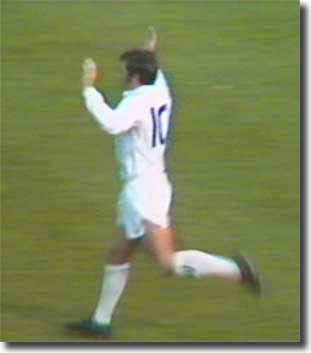 for McFarland, this being
his fifth booking this season, although the greater pity, as one Derby
journalist said, would be for him to lose his reputation as a footballing
centre-half.
for McFarland, this being
his fifth booking this season, although the greater pity, as one Derby
journalist said, would be for him to lose his reputation as a footballing
centre-half.